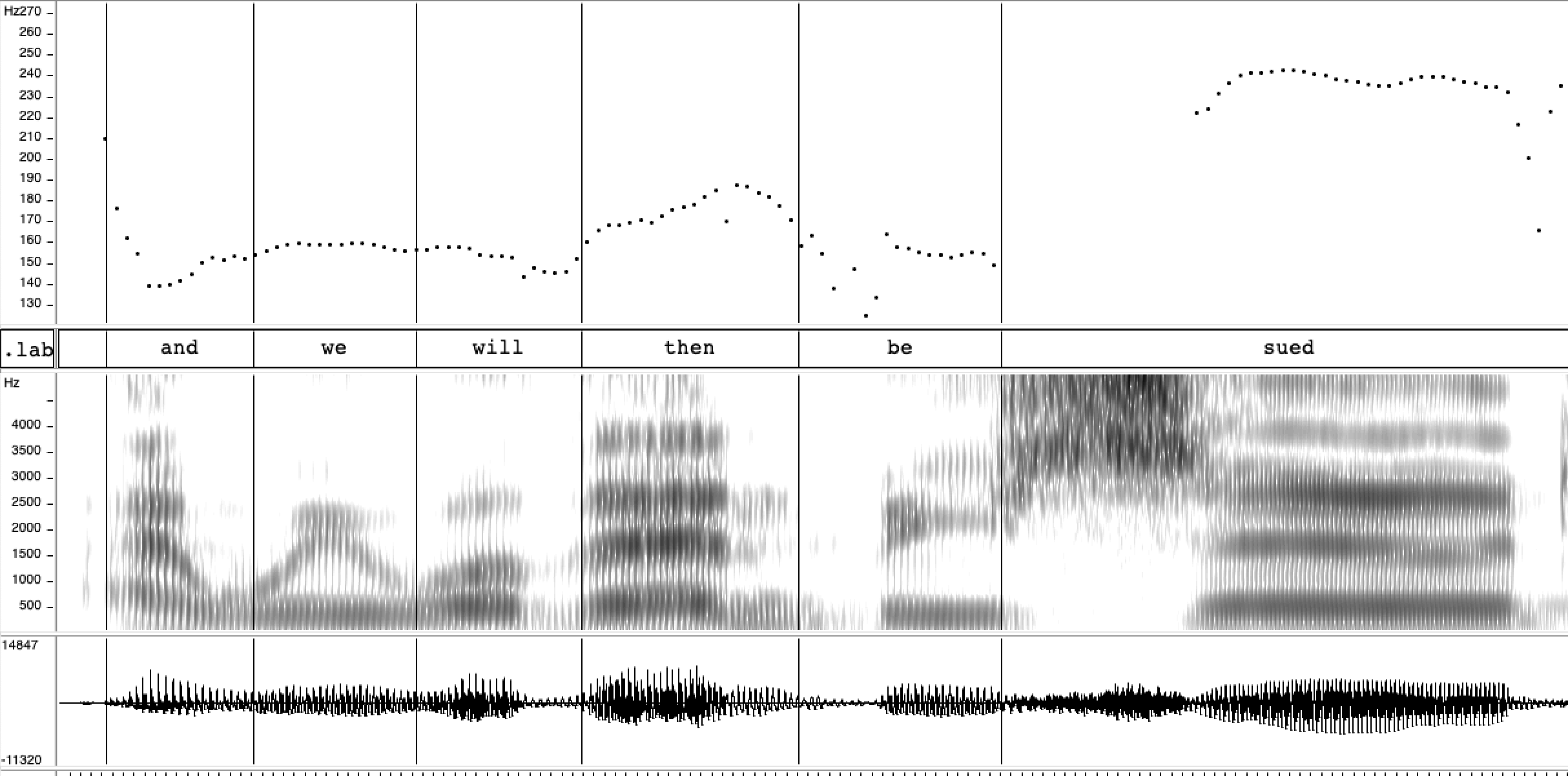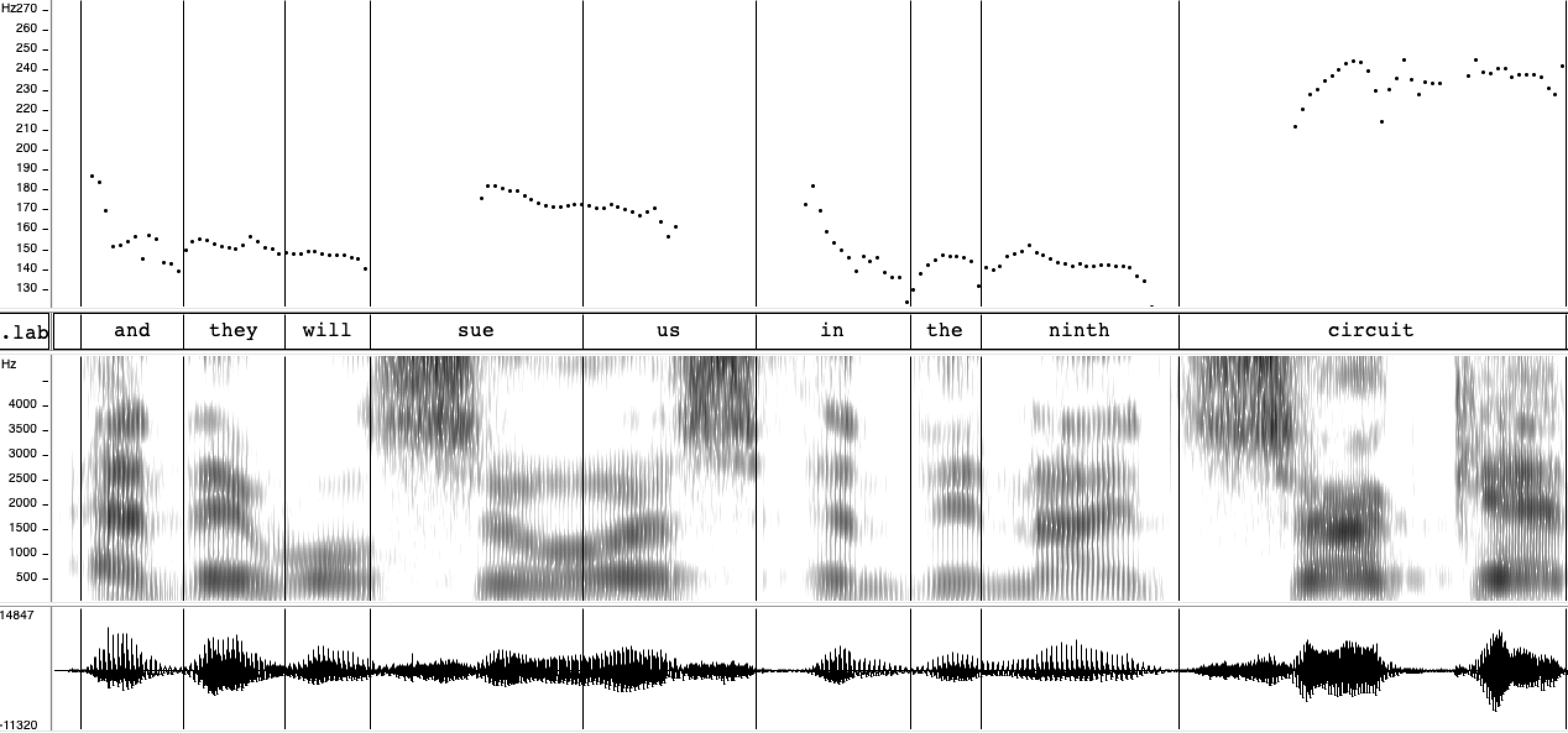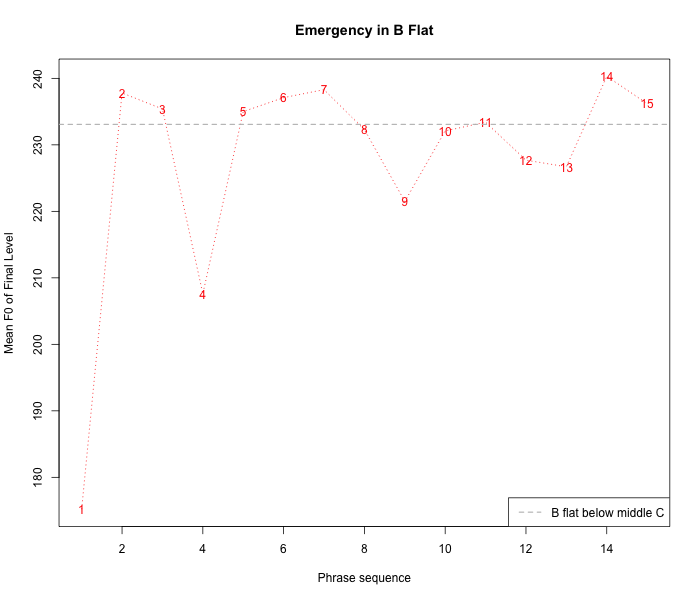Emergency in B flat
« previous post | next post »
In his 2/15/2019 announcement about declaring a state of emergency on the southern border, President Trump used a striking sequence of fifteen singsong phrases:
So the uh the order is signed. And uh I'll f- I'll sign the final papers as soon as I get into the Oval Office. And we will have a national emergency, and we will then be sued, and they will sue us in the 9th Circuit, uh even though it shouldn't be there, and we will possibly get a bad ruling, and then we'll get another bad ruling, and then we'll end up in the Supreme Court, and hopefully we'll get a fair shake and we'll win in the Supreme Court. Just like the ban, they sued us in the 9th Circuit and we lost, and then we lost in the appellate division, and then we went to the Supreme Court and we won.
I've previously described cases where Trump uses singsong intonation or stretches of level pitch in a chanted voice quality. Thus in "Trump's prosody", 8/8/2016, I described "six repetitions — three pairs — of a binary pattern, in which a low-pitched region is followed by an abrupt jump to a much higher value, in some cases more than an octave up, starting with an emphasized word and continuing nearly level to the end of the phrase". I suggested that
I suspect that there's a bit of New York City here. And I think that Mr. Trump tends to use this pattern when he enumerates problems or promises that he thinks ought to be obvious or at least already known.
And Rachel Steindel Burdin wrote in response to that post to say that
We did a couple of perceptual experiments, which found first, in a forced choice task, subjects reliably hear these rises-to-plateaus as signaling that speaker thinks the listeners already knows the items in the list, and second, subjects hear the plateaus as making the speaker sound condescending. As for the potential New York connection–I looked into Jewish English intonation for my dissertation […], and found some evidence for increased use of these types of contours by older Jews in listing environments. So, I'd say it's definitely likely, at least to the extent that we want to connect Jewish English intonation to New York City intonation.
In this case, Trump starts with a less-obviously chanted version of the pattern:
…and then goes into a long sequence where the syllable-by-syllable pitches are more level in pitch and sound more like singing, and the phrase-final level stretches are higher in pitch, as in the next couple of phrases:
…and so on.
Measuring the average f0 of the final level stretches suggests that once again, the president is performing in (or around) the key of B♭:
- And we will have a national emergency
- and we will then be sued
- and they will sue us in the 9th Circuit
- uh even though it shouldn't be there
- and we will possibly get a bad ruling
- and then we'll get another bad ruling
- and then we'll end up in the Supreme Court
- and hopefully we'll get a fair shake
- and we'll win in the Supreme Court
- Just like the ban
- they sued us in the 9th Circuit
- and we lost
- and then we lost in the appellate division
- and then we went to the Supreme Court
- and we won
Alec Baldwin's SNL version is here — and again here.
For more on quasi-chanted passages in Trump's rhetoric, see "Trumpchant in B flat", 10/2/2016; "Blues in Moore flat", 12/15/2017.




David Marjanović said,
February 17, 2019 @ 6:28 pm
And here it is accessible from outside the US, which SNL generally isn't.
AntC said,
February 17, 2019 @ 8:52 pm
As soon as I heard that strange sing-song, I knew it would be appearing here. Thank you Mark.
Another explanation for the weird prosody: Trump is rehearsing all this procedural stuff because he's going to be using it to justify to his base why the Emergency Order will be overturned in the courts. So this is some sort of magical incantation.
The prosody sounds to me a lot like Jeanine Pirro of Fox News and of New York (and formerly a DA and judge, so presumably she knows the procedurals well; gawdelpusall that somebody so unhinged should ever have had any legal authority).
Trogluddite said,
February 17, 2019 @ 9:34 pm
My opinions of the POTUS may bias me a little, or maybe it's my delicate British ears; but, to me, that sounded strikingly like a parent scolding a child for not "acting their age". The sing-song repetition seemed to be there to emphasise the breaking down of the narrative into patronisingly small "baby steps", and to feign exasperation that such a thing should be necessary (as does the repetition of "and" and "then" to join the phrases.) I wasn't surprised, then, to read Rachel Steindel Burdin's findings (as usual, I listened to the complete clip before reading the body of the post.)
Michael Watts said,
February 18, 2019 @ 1:57 am
My impression as a listener of the meaning of the intonation:
To me, this sounds like it signals two things — first, that the speaker is presenting the list as objectionably long; and second, that the speaker is presenting the list items as being unimportant. The vibe is "I have to say these things; hold on and I'll eventually get through them… all…". Imagine rolling your eyes ostentatiously every couple of items.
That impression isn't really compatible with the fact that Trump uses the same intonation on the final element, "and we won", which terminates the list (so indicating that the list just keeps going and going is weird) and is a victory for him (so trivializing it is weird).
But it's very compatible with the report that people think this makes the speaker sound condescending.
I didn't find the prosody to be strange — it felt natural to me, except for its use on "and we won". But given that I was surprised there, it seems possible that this same prosodic feature is used with different meanings by different speech communities.
Michael Watts said,
February 18, 2019 @ 1:57 am
(I messed up terminating the bolding in my comment — I only intended for the word "won" to be bolded.)
ouen said,
February 18, 2019 @ 3:14 am
largely i agree with Michael Watts.
i'm a little surprised that you say you didn't find it strange though. the speech style and it's communicative purpose are totally banal in many circumstances, but is it not somewhat strange to hear it spoken on such an exalted stage?
(unless of course you are expressing the valid opinion that very little of what the current POTUS says or does is carried out in a way consistent with the expected demeanor of his role)
Michael Watts said,
February 18, 2019 @ 4:07 am
It is (in my view) overtly disrespectful, but I'm pretty sure that that doesn't conflict with Trump's views on the subject. I'm also pretty sure that being overtly disrespectful is normal at all social levels. I wouldn't say that the speech's venue conflicts with the style or the communicative purpose; the major conflict I see between the delivery of this message and the "exalted stage" is that this message strongly implies (as I read it) that you shouldn't take the things it refers to seriously, and speech from an exalted stage generally tries to convey the impression that whatever it's talking about is a serious matter.
But none of that is what I meant by saying I didn't find the prosody strange. I was referring to this commentary from AntC:
This looked to me like AntC didn't believe the prosody was normal for English. I disagree; I experienced it as normal, fluent English spoken with contextually appropriate prosody. (That is, prosody that makes sense given the speaker's likely intent and opinions.)
Eric said,
February 18, 2019 @ 4:46 am
It conveys that his opposition is a joke, which is secondary to the real message, which is I am powerful.
David Marjanović said,
February 18, 2019 @ 5:38 am
Tired of winning?
More likely, the winning is presented as so predictable it won't be exciting.
John Swindle said,
February 18, 2019 @ 6:56 am
If he had added "So there!" at the base pitch after "and we won" it wouldn't sound quite so weird to my American ears. (For any who don't have that particular "so there!", it's accented on the second word, means "QED," and may be followed by sticking out the tongue through pursed lips.)
AntC said,
February 18, 2019 @ 7:08 am
@Michael W This looked to me like AntC didn't believe the prosody was normal for English.
I didn't and I don't, after reading the comments. It's extremely/unusually marked prosody in any context, let alone from somebody who's supposed to be carrying the gravitas of office. It sounds mocking, insulting and disrespectful (of whoever is its target — the legal system in this case).
I agree with @Trogluddite (me ears are also British, mostly): it's the tone of a parent scolding. A bad parent: a parent who is not fit for the responsibility of bringing up children; a parent who is unaware that parenting entails not behaving like a petulant child yourself; a parent who does not understand that mocking and patronising is something children do in the playground (and it's not appropriate there).
being overtly disrespectful is normal at all social levels.
There are appropriate ways to express disrespect of authority figures/institutions that are overbearing or over-reaching (irony, satire, appeal to logic, appeal to decency, to natural justice). But that level of petulance amongst adults? I think not. Maybe privately with your significant other after a particularly frustrating day at work: let off steam at a boss whose only 'management technique' is to mock and belittle staff. That prosody is not "contextually appropriate" in any public place.
BTW the office of POTUS itself used to represent a figure of authority up to a couple of years ago — especially from the previous 8 years of hard work to regain respect after the prior holder. How on earth can the most powerful single individual of the world's only superpower play the victim game?
Mark P said,
February 18, 2019 @ 9:04 am
AntC, I agree with you on this. To my ears it was completely inappropriate, and completely consistent with what we have come to expect.
Shubert said,
February 18, 2019 @ 9:32 am
To express my appreciation to read this thread, please enjoy this song:
https://www.youtube.com/watch?v=OHX62AgJULM
Michael Watts said,
February 18, 2019 @ 9:43 am
This view is actually incompatible with the view that there's something strange about the prosody itself. If Donald Trump were to use intonation that conflicted with normal English usage, it wouldn't sound insulting. It would sound foreign.
As to the "parent scolding" interpretation, I'm guessing that's a difference between American and British English. I cannot visualize a parent expressing their anger by emphasizing how boring the litany of the child's misdeeds is.
I'm also going to have to disagree that "mocking" is an inappropriate way to express disrespect while "satire" isn't. Satire is a type of mockery.
Justin Long said,
February 18, 2019 @ 10:29 am
Some other evidence that the President was in a New York state of mind: his reference to the "appellate division," which is the NY-specific term for the state appellate court (although here he clearly meant the federal court).
Viseguy said,
February 18, 2019 @ 2:39 pm
@Justin Long: I'm guessing that Trump has a long history of being sued in New York state courts (e.g., by stiffed creditors), whereas his experience with being dragged through the federal courts only started in earnest after he became president.
To me, the whole sing-song recital spoke of his contempt for legal process, or any process — as if to say, in the voice of a petulant three-year-old, Can't we just get to the part where I win?
Jim said,
February 18, 2019 @ 8:03 pm
When he started in with that, I halfway expected him to say "neener-neener" at the end.
Anthony said,
February 18, 2019 @ 9:11 pm
a) I take it "neener-neener" is British for nyah-nyah.
b) Fowler, in The King's Englsih, notes that meter in one's prose is "a sure sign that the fit is on him." In the Trump-person's case, singsong counts as meter.
AntC said,
February 18, 2019 @ 11:30 pm
Satire is a type of mockery.
I think that might be exposing a difference in meaning of 'satire' in AmE vs the E of the cricket-playing nations. Let me wade into a cultural minefield.
I believe in the U.S. the following are regarded as satire: SNL (after the Jon Stewart era), Samantha Bee, Michelle Wolf. I would disagree that those are witty or sophisticated enough to count as satire. For me they're mostly mockery, and for that reason not funny. (I would of course defend Michelle W's 1st-amendment rights as an invited comedian. Alec Baldwin consistently fails to be as funny as the Trump original: it's just slapstick.)
It's noticeable how many US late night shows have imported hosts from the cricket-playing nations. But the best satirist currently is Stephen Colbert. He very seldom resorts to mockery; his humour is witty and satirical precisely because he respects the institutions of the US (particularly the office of President); and because he can draw a contrast between the respect he would like to show vs the ridicule which the current holder attracts.
One other accomplished US satirist I would credit: Barack Obama. His speeches at the White House Correspondents' dinners are masterful not only for their wit but also because they enhance the prestige of the office: as much self-deprecatory is 'digs' at other personages.
AntC said,
February 19, 2019 @ 3:29 am
Possibly Seth Meyers and Stephen Colbert have been reading this thread; or possibly the observations are blimmin' obvious.
Both said 'sing-song'. Meyers said 'ramblings', '5-year old'. Colbert said 'reciting his torah'. Both noted this is for consumption by his base, not the country as a whole. (Trump specifically mentioned Sean Hannity and Rush Limbaugh.) Neither thought this was acceptable behaviour for a President announcing a National Emergency.
(Oh, and Jon Batiste agrees Trump is in B flat.)
Also in another part of the speech, I'm sure I heard Trump say 'Nobel Peace Price'.
Michèle Sharik Pituley said,
February 19, 2019 @ 3:58 pm
@Anthony: “neener” has been in use in at least some parts of the US since at least the mid-1980s. We used it in south western rural Ohio (Warren County, bear Cincinnati).
Mark P said,
February 19, 2019 @ 5:08 pm
@Michael Watts — Call it mockery or satire; by any name it's punching down. When speaking to and about citizens of his own country, if the president of the United States punches, it can only be down, and I don't think that's acceptable behavior.
Rose Eneri said,
February 21, 2019 @ 10:55 am
To me, the entire POTUS litany represents a parenthetical or footnote to the body of the speech. It delineates something that does not need to be said because most listeners already know it (that his opponents will challenge his actions in the biased Ninth Circuit court where they will predictably will, but will then loose when the case gets to the US Supreme Court.) This is why the tone is monotonous and does not rise at the end.
POTUS says it to demonstrate that he is all too aware of what will transpire and that, in the end, it will have no effect.
For the British readers, I would compare the effect to POTUS saying to his opponents, "Go ahead. Do your worst. I'll win anyway." No rising tone here.
Stan Carey said,
February 22, 2019 @ 9:40 am
Musical version by Andrea Perry: https://www.youtube.com/watch?v=UCjibv5jMYo
David Marjanović said,
February 25, 2019 @ 4:39 am
^ A work of genius.